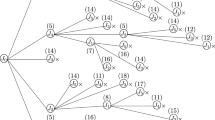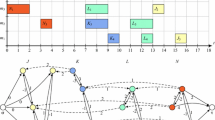Abstract
We consider a generalization of the classical job shop scheduling problem with release times, positive end–start time lags, and a general precedence graph. As objective we consider the total weighted tardiness. We use a tabu search algorithm to search for the order in which the operations are processed on each machine. Given a sequence of operations on each machine, we determine optimal starting times by solving a maximum cost flow problem. This solution is used to determine the neighborhood for our tabu search algorithm. All sequences in our neighborhood are obtained by swapping certain pairs of adjacent operations. We show that only swaps that possess a certain property can improve the current solution; if no such swap is available in the neighborhood, then the current solution is globally optimal. In the computational results we compare our method with other procedures proposed in literature. Our tabu search algorithm seems to be effective both with respect to time and solution quality.
Similar content being viewed by others
References
Aarts, B. J. M., “A parallel local search algorithm for the job shop scheduling problem,” Master's thesis, Department of Mathematics and Computing Science, Eindhoven University of Technology, 1996.
Aarts, E. H. L. and J. K. Lenstra (eds.), Local Search in Combinatorial Optimization, Wiley, Chichester, 1997.
Adams, J., E. Balas and D. Zawack, “The shifting bottleneck procedure for job shop scheduling”, Management Science 34, 391–401 (1988).
Ahuja, R. K., T. L. Magnanti and J. B. Orlin, Network Flows—Theory, Algorithms, and Applications, Prentice Hall, Englewood Cliffs, New Jersey, 1993.
Applegate, D. and W. Cook, “A computational study of the job shop scheduling problem”, ORSA Journal on Computing 3, 149–156 (1991).
Balas, E., “Machine sequencing via disjunctive graphs: an implicit enumeration algorithm”, Operations Research 17, 941–957 (1969).
De Bontridder, K. M. J., “Integrating purchase and production planning: using local search in supply chain optimization,” Ph.D. thesis, Department of Mathematics and Computer Science, Technische Universiteit Eindhoven, 2001.
Faaland, B. and T. Schmitt, “Scheduling tasks with due dates in a fabrication/assembly process”, Operations Research 35, 378–388 (1987).
Fisher, H. and G. L. Thompson, “Probabilistic learning combinations of local job-shop scheduling rules”, In J. F. Muth and G. L. Thompson (eds.), Industrial Scheduling, Prentice Hall, Englewood Cliffs, New Jersey, 1963, pp. 225–251.
Glover, F., “Tabu search: part 1”, ORSA Journal on Computing 1, 190–206 (1989).
Glover, F., “Tabu search: part 2”, ORSA Journal on Computing 2, 4–32 (1990).
Kreipl, S., “A large step random walk for minimizing total weighted tardiness in a job shop”, Journal of Scheduling 3, 125–138 (2000).
Lawrence, S., “Resource constrained project scheduling: an experimental investigation of heuristic scheduling techniques (supplement),” Technical report, Graduate School of Industrial Engineering, Carnegie Mellon University, Pittsburgh, Pennsylvania, 1984.
Nowicki, E. and C. Smutnicki, “A fast taboo search algorithm for the job shop problem”, Management Science 42, 797–913 (1996).
Pinedo, M., Scheduling: Theory, Algorithms, and Systems, Prentice Hall, Englewood Cliffs, New Jersey, 1995.
Pinedo, M. and M. Singer, “A shifting bottleneck heuristic for minimizing the total weighted tardiness in a job shop”, Naval Research Logistics 46, 1–19 (1999).
Roy, B. and B. Sussmann, Les problèmes d'ordonnancement avec contraintes disjonctives, Note DS No. 9 bis, SEMA, Montrouge, 1964.
Singer, M. and M. Pinedo, “A computational study of branch and bound techniques for minimizing the total weighted tardiness in flow shops and job shops”, IIE Transactions 30, 109–119 (1998).
Smith, W. E., “Various optimizers for single stage production”, Naval Research Logistics Quarterly 3, 59–66 (1956).
Standard Performance Evaluation Corporation, “Performance results specint95”, www.spec.org/cgi-bin/osgresults?conf=cint95, 1999.
Vaessens, R. J. M., Generalized Job Shop Scheduling: Complexity and Local Search, Ph.D. thesis, Department of Mathematics and Computing Science, Eindhoven University of Technology, 1995.
Vaessens, R. J. M., E. H. L. Aarts, and J. K. Lenstra, “Job shop scheduling by local search”, INFORMS Journal on Computing 8, 302–317 (1996).
Verhoeven, M. G. A. “Tabu search for resource-constrained scheduling”, European Journal of Operational Research 106, 266–276 (1998).
Wennink, M., “Algorithm support for automated planning boards,” Ph.D. thesis, Department of Mathematics and Computing Science, Eindhoven University of Technology, 1995.
Wennink, M., “Finding selection-optimal schedules by means of maximum cost flows”, Operations Research Letters, 2000, to appear.
Wennink, M. and R. Vaessens, “An efficient insertion algorithm with multiprocessor operations”, Working paper, Department of Mathematics and Computing Science, Eindhoven University of Technology, 1995.
Author information
Authors and Affiliations
Corresponding author
Additional information
The research was carried out at the Technische Universiteit Eindhoven and the Universiteit Utrecht with support of Baan and the Future and Emerging Technologies programme of the EU under contract number IST-1999-14186 (ALCOM-FT).
Rights and permissions
About this article
Cite this article
De Bontridder, K.M.J. Minimizing Total Weighted Tardiness in a Generalized Job Shop. J Sched 8, 479–496 (2005). https://doi.org/10.1007/s10951-005-4779-7
Issue Date:
DOI: https://doi.org/10.1007/s10951-005-4779-7




